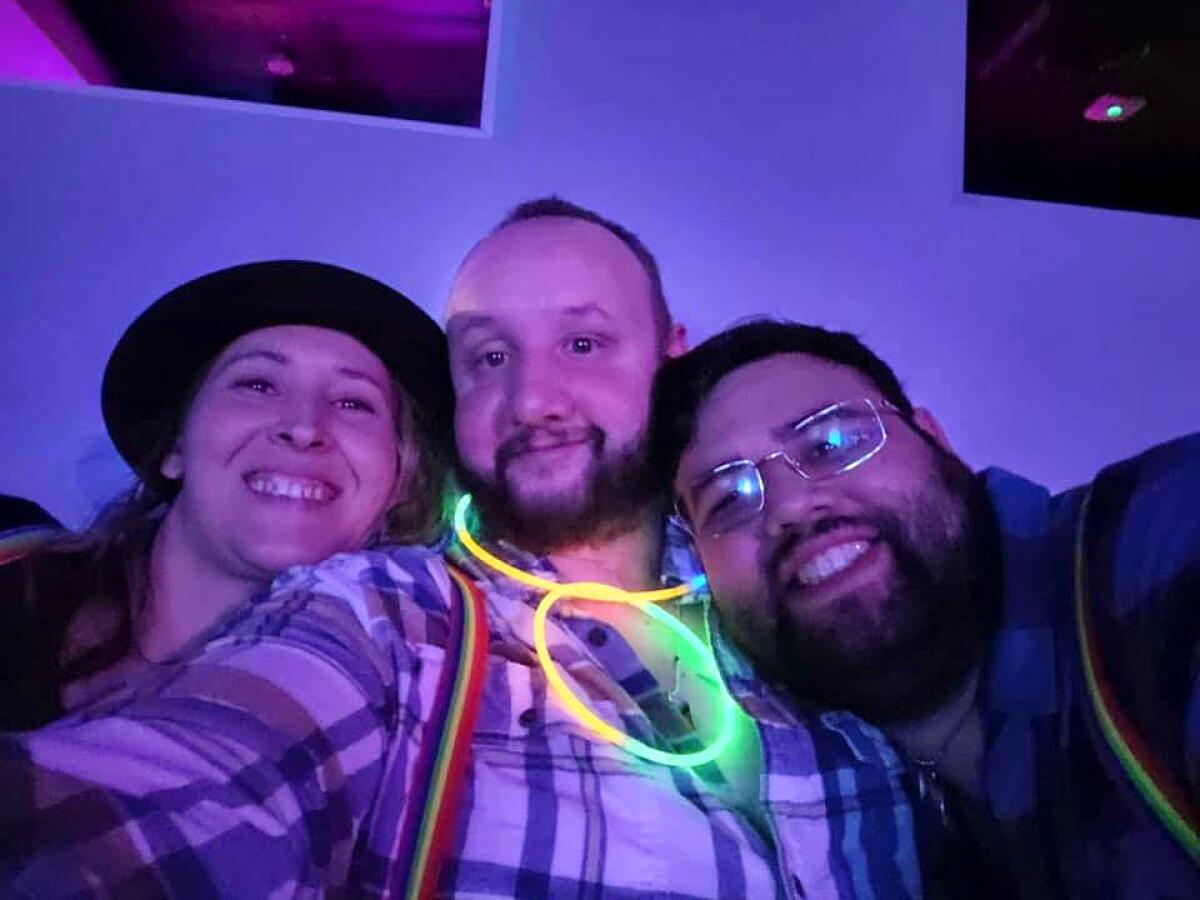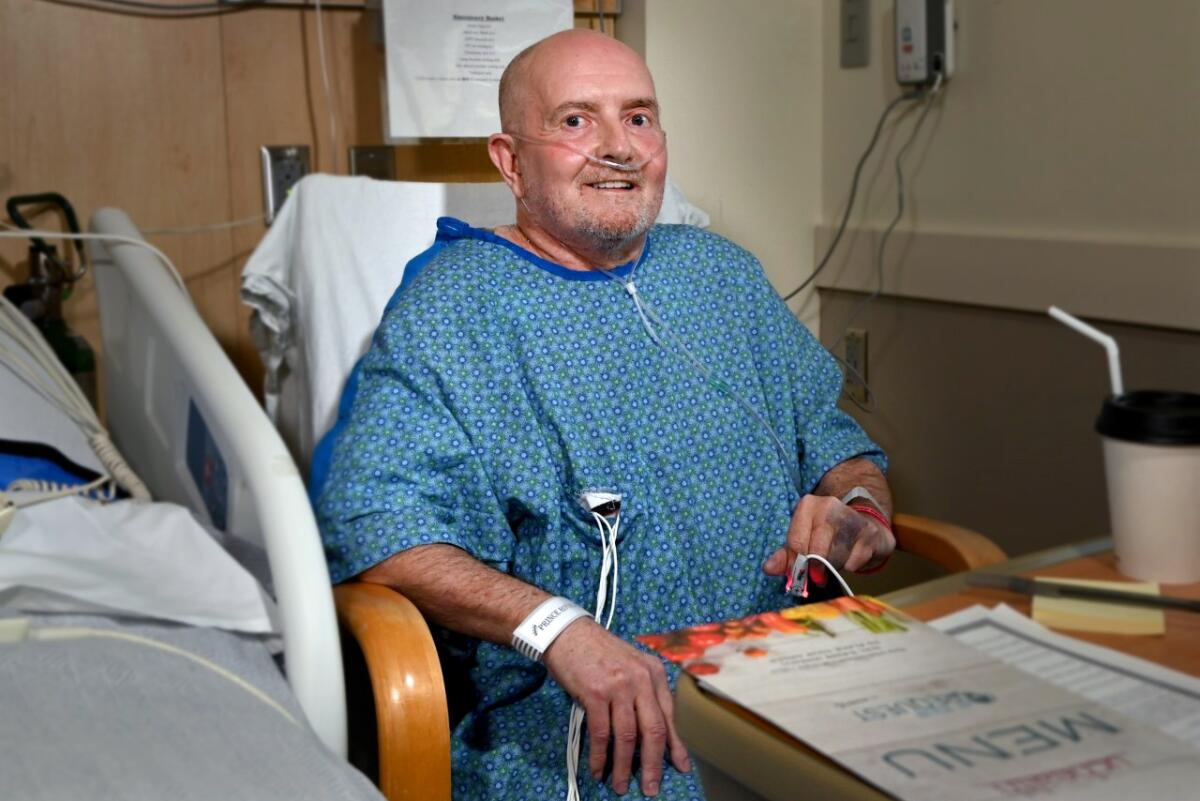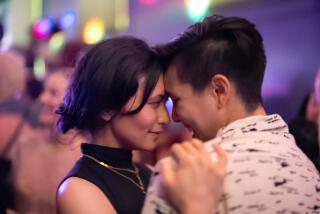Safety, laughter, love: Club Q represented the opposite of what the shooting there evoked

- Share via
COLORADO SPRINGS, Colo. — In its most trying hour, as an armed assailant waged war on its patrons, Club Q remained what its clientele has long cherished, and what queer bars everywhere have been for generations: a source of kindness and community, where people look out for one another.
After Ed Sanders was shot in the back and leg, he collapsed to the floor beside the bar, next to a woman he didn’t know.
Sanders, 63, covered her with his coat in an attempt to shield her from whatever onslaught might come next, he said in an interview from his bed at UCHealth Memorial Hospital Central in Colorado Springs.
Once others in the crowd took down the shooter, more patrons rushed forward to help the wounded, he said.
“There was a lot of people helping each other. People who weren’t hit were helping,” said Sanders, who has been going to the club since its opening night two decades ago. “Just like a family would do.”
Amid stories of heartbreak and devastation from Saturday night’s shooting, which left five dead and 18 others injured, there are tales of heroism, selflessness and deep compassion — based in large part on the special kinship shared by queer people and their allies.
Along with the pain has come an outpouring of love for Club Q and the people who made it what it was: a “safe space” to let loose and have fun for generations of LGBTQ people in an otherwise conservative town.
It’s a legacy that must not be forgotten or ignored, regulars said — particularly in an era of political attacks on LGBTQ establishments.
Club Q had been set to host a drag brunch for “all ages” on Sunday. Such events have become a focus in the culture wars of American politics, with critics on the right suggesting they expose children to sexualized performers, and defenders on the left rejecting those arguments as baseless and reflective of misinformed stereotypes about LGBTQ people.
To understand what has been lost, according to longtime patrons, one must see Club Q not as a threat but as a sanctuary. It’s more than a bar or nightclub, they say — it’s a community center.
“It was a home for a lot of us,” said Victoria Kosovich, 34, who is transgender, lives in a rural community just outside of Colorado Springs and used to perform at Club Q as a drag queen.
“In conservative towns like Springs, a lot of us got pushed away from birth families because we couldn’t keep lying to ourselves and those we care about. When that happens, places like Q give us a place to find new family that we choose and, in turn, who choose us.”
The day after the shooting, mourners showed up outside the venue to honor the dead, the wounded and Club Q itself, lest the world misunderstand the scope of their grief.
“We’re here not just paying respect to the people; we’re paying respect to the club,” said Shenika Mosley, 34, who was there with her wife, Jennifer Pena-Mosley, 23.
“There was so much laughter here and love here,” said Sophie Aldinger, 23, who is nonbinary. “For such an ugly thing to happen here is not right.”
Sophie Bjork-James, an assistant professor of anthropology at Vanderbilt University, has studied hate crimes, anti-LGBTQ bias and the far right and religious ideologies that have helped propel them. In the face of so much recent rhetoric that “the queer community is threatening in some way,” she said, it is important to point out that bars like Club Q are just the opposite: “incredibly welcoming places” that provide safety.
“There’s this image of what this community is like that is just the polar opposite of what is actually happening,” Bjork-James said. “Gay clubs are not these
hedonist dens of people getting drunk and dancing. They are spaces that create community for people who have been rejected — many of them by their families, many of them by their churches.”
For nearly 50 years, members of Colorado Springs’ LGBTQ community have raised funds for local charities through a club called the United Court of the Pikes Peak Empire — part of a broader charitable organization that has clubs from Canada to Mexico.
They raise funds with drag shows, bingo nights and other events. They give it all away to organizations that provide safe spaces for LGBTQ teens, fight cancer and support other causes.
Joseph Shelton, 26, president of the group’s board of advisors, said Club Q is “nine times out of 10” where the group hosts events.
“It’s where we go for almost everything,” he said. “They’ve stayed strong on the belief that every LGBT person, no matter their identity — and allies — has a place to go and have fun and be safe and live their lives authentically.”
Shelton and Sanders, who is a member of the organization, spent part of Saturday at an event hosted by their group’s sister chapter in Denver.
That night, Shelton dropped his friend at Club Q, briefly going inside before heading home.

He hadn’t been home 10 minutes when the group’s “empress,” the drag queen Hysteria Brooks, called to say there had been a shooting. Soon after, Shelton’s cousin called, saying one of her friends had been shot at the bar.
Shelton jumped in his car and headed back to the club. Police cars and ambulances were flying by; he tried to tell himself they weren’t all for Club Q.
In the days since, Shelton has talked to the bars’ owners and local LGBTQ leaders about what comes next. Should the club reopen or become a memorial? Viewpoints vary — except on one matter.
“We’re not going to hide in a hole. We’re not going to go back in the closet,” Shelton said. “We’re going to come out of this bigger, we’re going to come out of this stronger, we’re going to come out of it wiser.”
James Slaugh is another regular at Club Q. He and his boyfriend, Jancarlos Dell Valle, both 34, met there about eight months ago. They came for karaoke, drag shows or to hang out with other regulars and staff — who were always “super nice.”
“We knew the owners. We knew the drag queens. We knew people who would call us by our name, knew our orders,” Slaugh said. “Club Q was a safe space for me to learn who I was and understand my sexuality.”
On Saturday, the couple decided to cheer up his sister, Charlene Slaugh, 35, who had recently broken up with her girlfriend. The three headed to the club.
After a night of dancing, they were preparing to leave when the shooter came in.
Charlene was shot multiple times, including through the abdomen. Her left lung collapsed. She lost half the blood in her body before reaching the operating table, the family has said, and faces a tough recovery.
Dell Valle was shot in the leg. Slaugh said he was shot from behind in the arm, shattering a bone.
After the shooting stopped, he said, things went eerily silent, but for the techno music still playing. It was scary. He didn’t know if the shooter had left or was reloading.
Then, he heard someone — possibly Richard Fierro, a U.S. Army veteran who helped take down the shooter — screaming for people to call the police, and others in the bar, who had hidden or dived to the ground, “got up and started helping people,” he said.
One stranger came up to him, assessed his wound, told him he would be OK, then kissed him on the forehead.
“To me, that made all the difference,” Slaugh said Tuesday from his hospital bed. “Everyone there who wasn’t injured did something. They were going around checking on people. ... That is just a testament to the love and the connectedness that we all feel.”
More to Read
Sign up for Essential California
The most important California stories and recommendations in your inbox every morning.
You may occasionally receive promotional content from the Los Angeles Times.











